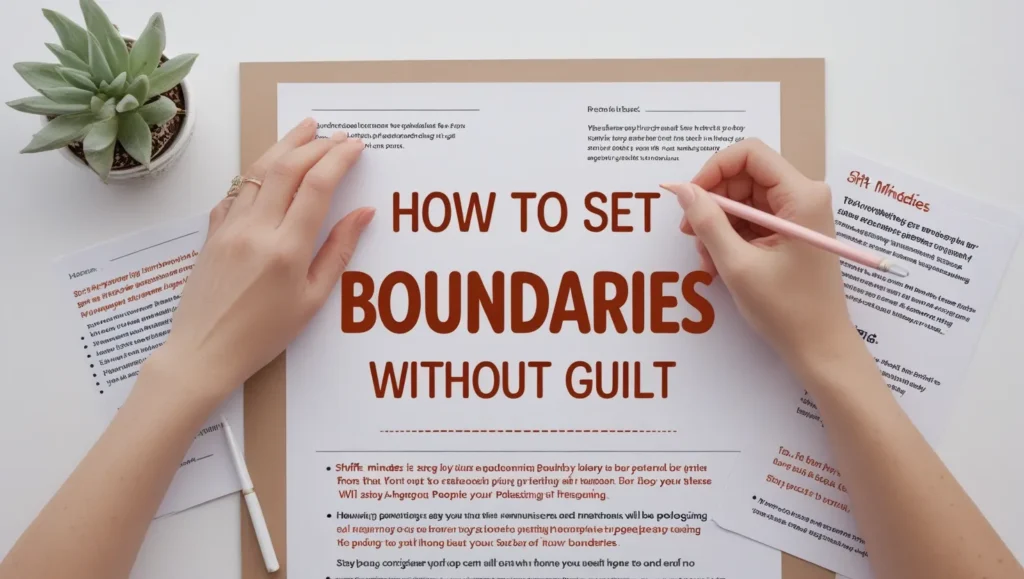Set Boundaries Without Guilt
In a world where people often equate saying “no” with being selfish, setting boundaries can feel uncomfortable, especially when guilt creeps in. Many of us fear disappointing others, damaging relationships, or being perceived as unkind. However, boundaries are essential for mental well-being, self-respect, and maintaining healthy relationships. Learning to set boundaries without guilt is not just a skill but a Set necessity for a balanced life.
Why Are Boundaries Important?
Boundaries define what is acceptable and unacceptable in our interactions with others. They help us protect our emotional, mental, and physical well-being while fostering mutual respect in personal and professional relationships. When we lack boundaries, we may experience stress, burnout, resentment, or a loss of self-identity.
By setting boundaries, we:
- Communicate our needs and values.
- Maintain control over our time and energy.
- Reduce stress and anxiety.
- Foster healthier, more balanced relationships.
- Enhance our self-esteem and confidence.
Overcoming Guilt When Setting Boundaries
Guilt often arises because we have been conditioned to prioritize others’ needs over our own. It’s crucial to recognize that setting boundaries is not about being rude or selfish—it’s about self-respect and self-care. Here’s how to set boundaries confidently without feeling guilty:
1. Shift Your Mindset
Many people struggle with boundaries because they associate saying “no” with rejecting someone personally. In reality, setting a boundary is about protecting your well-being, not about rejecting others. Understand that boundaries strengthen relationships rather than harm them, as they promote respect and clear expectations.
2. Know Your Limits
Take time to reflect on your physical, emotional, and mental limits. Ask yourself:
- What makes me feel uncomfortable or overwhelmed?
- When do I feel drained after interacting with certain people or situations?
- What behaviors do I tolerate that I no longer want to accept?
Understanding your limits helps you define boundaries that protect your well-being.
3. Communicate Clearly and Firmly
When setting boundaries, be direct and assertive. You don’t have to justify or over-explain your decisions. Use “I” statements to express your needs without sounding accusatory. For example:
- Instead of saying: “I can’t help you because I’m too busy,” say: “I have other commitments and won’t be able to help this time.”
- Instead of saying: “You’re always asking for favors,” say: “I need to set some limits on the favors I can do.”
Being firm yet respectful communicates your boundaries without inviting negotiation.
4. Practice Saying ‘No’ Without Apologizing
Many people struggle with saying “no” because they feel the need to soften it with excessive apologies or justifications. Instead of saying:
- “I’m so sorry, but I can’t make it this time.” Say: “I won’t be able to join this time, but I hope you have a great time!”
You don’t owe an apology for prioritizing your well-being.
5. Be Prepared for Pushback
Some people may resist your boundaries, especially if they were accustomed to you always saying “yes.” Stay firm and don’t feel guilty about upholding your limits. People who truly respect and care for you will eventually adjust and appreciate your honesty.
6. Let Go of People-Pleasing Tendencies
If you constantly seek approval from others, setting boundaries will feel uncomfortable at first. However, trying to make everyone happy at your own expense leads to burnout. Understand that you cannot control how others react to your boundaries, and their disappointment does not mean you did something wrong.
7. Prioritize Self-Care Without Guilt
Taking care of yourself is not selfish—it’s necessary. When you prioritize your needs, you have more energy and mental clarity to support others effectively. Whether it’s taking time to rest, pursuing hobbies, or simply declining an invitation, recognize that self-care is a valid reason for setting boundaries.
8. Set Boundaries Consistently
Consistency is key to making boundaries effective. If you allow exceptions too often, people may not take your boundaries seriously. Stay committed to your decisions and practice enforcing them regularly.
9. Seek Support When Needed
If setting boundaries feels overwhelming, seek guidance from a mentor, therapist, or support group. Sometimes, an outside perspective can help you navigate difficult conversations and reinforce your confidence.
10. Accept That You Can’t Please Everyone
No matter how kind and accommodating you are, you can’t make everyone happy. Accepting this truth can free you from the guilt associated with setting boundaries. The right people will respect and support your need for space and self-care.
Final Thoughts
Setting boundaries without guilt is a powerful act of self-love and self-respect. It allows you to cultivate healthier relationships, avoid burnout, and create a life that aligns with your values. Remember, it’s not selfish to protect your time, energy, and mental well-being—it’s essential. Start small, stay firm, and embrace the freedom that comes with healthy boundaries.

